
Charlie Brown understands what's truly important about Christmas.


Charlie Brown understands what's truly important about Christmas.

I read the Peanuts comics a lot while growing up. My summer reading every year entailed checking Peanuts comic books from the library as an elementary student. I always related to Charlie Brown because I too was an unpopular kid, being teased and laughed at, being ridiculed by girls, and being abandoned by friends. Charlie Brown can never achieve at anything, and the Peanuts shows are quite often rather depressing because of Charlie Brown's predicament.
The message of the Charlie Brown Christmas Special is even more potent in this present day than when it was aired in December of 1965. It is shown every year on TV, but perhaps most people never bother to pay attention to the message that Charles Schulz was trying to convey. More than just a kids show, these Peanuts episodes are multi-layered and provide great social commentary and philosophy, and this episode in particular has a powerful message. In this age of cynicism and apathy, the message of Jesus Christ is needed now more than ever.
We now live in an age where people get tramped to death on Black Friday at Wal Mart, and people get into fist fights over buying toys for our children. I have a friend who worked at Kaybee Toys for years, and as a result, he grew to hate Christmas. He had parents screaming profanities at him right in front of their own children, complaining about being sold the wrong toy or whatever that wasn't even his fault. These kids are growing up thinking that this is an acceptable way to treat others, and society degenerates with each new generation. This is shocking and depraved, but such is what American society has deteriorated into. The Charlie Brown Christmas Special was first aired in 1965, and nearly 50 years later, Christmas has become so much worse! The main point of the show is that Christmas is getting too commercial. As Lucy tells Charlie Brown in a conspiratorial tone, "Everyone knows that Christmas is a big commercial racket. It's run by a big Eastern syndicate, you know." Underneath the silly humor is the truth that American society values commercialism and greed more than God and family.
 So here enters Charlie Brown, who is understandably (and predictably) depressed. His depression and loneliness embodies the lost feelings of isolation that so many people today have during the holiday season. We have collectively allowed marketing and materialism to become the focal point of Christmas, leading to so much emptiness and depression this time of year. The tragic irony is that the true message of Christ is exactly for those who are disenfranchised during the holidays, but our collective greed has removed Christ from being the focal point of Christmas to the point that this message no longer lives. We now live in an age where imbecilic atheists go around, pretending to be offended by anything religious during Christmas, removing manger scenes and demanding that people call Christmas trees "holiday trees" and endeavor to remove the word "Christmas" as much as possible so as to be completely politically correct and devoid of any passion. This has only succeeded in creating a void in everyone's hearts.
So here enters Charlie Brown, who is understandably (and predictably) depressed. His depression and loneliness embodies the lost feelings of isolation that so many people today have during the holiday season. We have collectively allowed marketing and materialism to become the focal point of Christmas, leading to so much emptiness and depression this time of year. The tragic irony is that the true message of Christ is exactly for those who are disenfranchised during the holidays, but our collective greed has removed Christ from being the focal point of Christmas to the point that this message no longer lives. We now live in an age where imbecilic atheists go around, pretending to be offended by anything religious during Christmas, removing manger scenes and demanding that people call Christmas trees "holiday trees" and endeavor to remove the word "Christmas" as much as possible so as to be completely politically correct and devoid of any passion. This has only succeeded in creating a void in everyone's hearts.
|
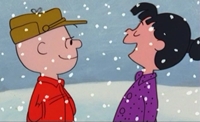 This emptiness is clearly represented among Charlie Brown's peers. Here is Violet proudly announcing that she would never give Charlie Brown a Christmas card. Here is Freida's narcissism, who is completely without compassion for Pig Pen and is disgusted by him. Here is Lucy and her fixation with money. Snoopy is a part of it too, entering his dog house into a Christmas decoration contest to earn "MONEY MONEY MONEY!" And here is Sally, who clearly represents American greed by having her older brother list her demands in a letter to Santa Claus. As Sally says, and is often quoted by Mike Nelson from MST3K fame, "All I want is what I have coming to me. All I want is my fair share." These are the words of typical Americans who demand entitlements. And with the recent reelection of Barrack Hussein Obama (aka Barry Soetoro and who knows what other names he's gone by), it is evident that there are quite a lot of these people who only want "what's coming to them." John F. Kennedy, the last great Democrat President is famous for saying, "My fellow Americans, ask not what your country can do for you; ask what you can do for your country." Sadly, the exact opposite has become the slogan of the modern day Democrat Party, as is evidenced by so many of those who voted to reelect Obama/Soetoro. (And obviously MLK's dream that his four children "will not be judged by the color of their skin, but by the content of their character" speech no longer has any meaning to Obama voters, least of all apparently the racist Samuel L. Jackson who admitted to vote for Obama just because he wasn't a white guy. The same Samuel L. Jackson who can only act in movies as either an angry black guy or a boring-as-hell character like Mace Windu or Nick Fury.)
This emptiness is clearly represented among Charlie Brown's peers. Here is Violet proudly announcing that she would never give Charlie Brown a Christmas card. Here is Freida's narcissism, who is completely without compassion for Pig Pen and is disgusted by him. Here is Lucy and her fixation with money. Snoopy is a part of it too, entering his dog house into a Christmas decoration contest to earn "MONEY MONEY MONEY!" And here is Sally, who clearly represents American greed by having her older brother list her demands in a letter to Santa Claus. As Sally says, and is often quoted by Mike Nelson from MST3K fame, "All I want is what I have coming to me. All I want is my fair share." These are the words of typical Americans who demand entitlements. And with the recent reelection of Barrack Hussein Obama (aka Barry Soetoro and who knows what other names he's gone by), it is evident that there are quite a lot of these people who only want "what's coming to them." John F. Kennedy, the last great Democrat President is famous for saying, "My fellow Americans, ask not what your country can do for you; ask what you can do for your country." Sadly, the exact opposite has become the slogan of the modern day Democrat Party, as is evidenced by so many of those who voted to reelect Obama/Soetoro. (And obviously MLK's dream that his four children "will not be judged by the color of their skin, but by the content of their character" speech no longer has any meaning to Obama voters, least of all apparently the racist Samuel L. Jackson who admitted to vote for Obama just because he wasn't a white guy. The same Samuel L. Jackson who can only act in movies as either an angry black guy or a boring-as-hell character like Mace Windu or Nick Fury.)
|
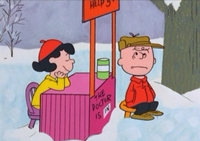 So anyhow, Charlie Brown is very troubled, and his soul longs for something more. He internalizes his problems and thinks that there must be something wrong with himself, rather than society as a whole. He first seeks "psychiatric help" from his friend/enemy (or "frenemy"), Lucy. She says he just needs involvement, so she enlists him to become the director of the Christmas play. But it is evident that nobody is taking it seriously. Charlie Brown is the lone voice of reason, desperately yearning for something greater... only to be disappointed by the attitudes of his friends and seeing his own dog winning first place in the gaudy decoration contest. (Since Charles Schulz was obviously horrified with gaudy Christmas decorations and aluminum Christmas trees, I really wonder what he would think of those ridiculous, energy wasting, light-up inflatable balloon figures that people put in their yards at Christmas time these days. I personally can't stand them.) When Charlie Brown goes looking to buy a Christmas tree, he ignores all of the artificial trees and chooses something with soul; something real. Upon seeing it, Linus remarks, "Gee, do they still make wooden Christmas trees?" Charlie Brown sees something in the tree that others don't. The small, humble Christmas tree seems to represent his glimmer of hope in finding the true meaning of Christmas. Perhaps this pathetic tree is all that the true meaning of Christmas has become, as if the true meaning of Christmas is something genuine, yet small and mostly overlooked with the sensory overload of gaudy, flashy Christmas ornaments. He chooses this tree, at the risk of scorn from the other kids, because he sees that it represents something genuine and real about Christmas.
So anyhow, Charlie Brown is very troubled, and his soul longs for something more. He internalizes his problems and thinks that there must be something wrong with himself, rather than society as a whole. He first seeks "psychiatric help" from his friend/enemy (or "frenemy"), Lucy. She says he just needs involvement, so she enlists him to become the director of the Christmas play. But it is evident that nobody is taking it seriously. Charlie Brown is the lone voice of reason, desperately yearning for something greater... only to be disappointed by the attitudes of his friends and seeing his own dog winning first place in the gaudy decoration contest. (Since Charles Schulz was obviously horrified with gaudy Christmas decorations and aluminum Christmas trees, I really wonder what he would think of those ridiculous, energy wasting, light-up inflatable balloon figures that people put in their yards at Christmas time these days. I personally can't stand them.) When Charlie Brown goes looking to buy a Christmas tree, he ignores all of the artificial trees and chooses something with soul; something real. Upon seeing it, Linus remarks, "Gee, do they still make wooden Christmas trees?" Charlie Brown sees something in the tree that others don't. The small, humble Christmas tree seems to represent his glimmer of hope in finding the true meaning of Christmas. Perhaps this pathetic tree is all that the true meaning of Christmas has become, as if the true meaning of Christmas is something genuine, yet small and mostly overlooked with the sensory overload of gaudy, flashy Christmas ornaments. He chooses this tree, at the risk of scorn from the other kids, because he sees that it represents something genuine and real about Christmas.
|
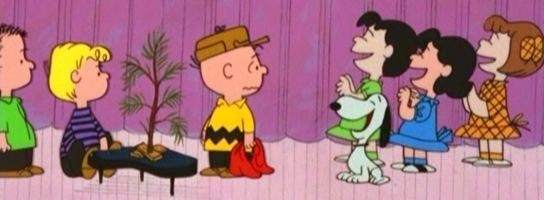
|
And there were in the same country shepherds abiding in the field, keeping watch over their flock by night. And, lo, the angel of the Lord came upon them, and the glory of the Lord shone round about them: and they were sore afraid. And the angel said unto them, Fear not: for, behold, I bring you good tidings of great joy, which shall be to all people. For unto you is born this day in the city of David a Saviour, which is Christ the Lord. And this shall be a sign unto you; Ye shall find the babe wrapped in swaddling clothes, lying in a manger. And suddenly there was with the angel a multitude of the heavenly host praising God, and saying, "Glory to God in the highest, and on earth peace, good will toward men."
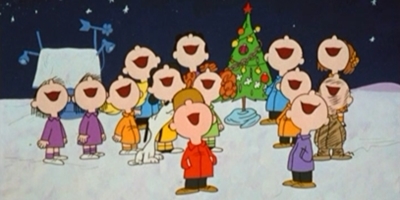
In the end, all of the kids come to their senses, and the episode ends with them all singing the carol, "Hark the Herald Angels Sing."
Why I do not like Santa Claus
 "I saw what you did in the bathtub last night, and again before you went to bed!" |
The focus of Christmas has been on Santa Claus for far too long. Santa Claus detracts from Christ, and elevating St. Nicholas to the level of an omniscient judge of children's behavior is essentially idolatry. Moreover, keeping the myth of Santa Claus alive requires deception, and basically lying to children. All of this magical crap and emotional blackmail... is this the legacy that St. Nicholas would want? Certainly not.
As I grew older, I started asking questions about whether Santa Claus was really real or not. Eventually, I figured out that the Easter Bunny was ridiculous and the Tooth Fairy was a fraud, yet I still held onto the idea that Santa Claus was real. I did not want to believe that my parents were lying about something so important. I remember one year when my dad had lost his contracting job, finances were tight and Mom told me that we might not have a Christmas that year. I faithfully said, "It's okay, Mom! Santa will still give me presents." Then a look of sadness swept over her face, because she had really painted herself into a corner then. If she had only told me the truth beforehand, it wouldn't have been so bad for her. But instead, she was stuck in her lie, and she just said that it was a "tough year for Santa too" or something. Fortunately that year, finances came back as a real blessing, and we had a normal Christmas anyway. But if Mom had only been up front and honest, then she would not have been in such a difficult position like that. Unfortunately for my sister, she was in the 6th grade when she finally discovered the truth about Santa, and she was humiliated when her classmates laughed at her for being the only 12 year old in school who still believed in Santa.
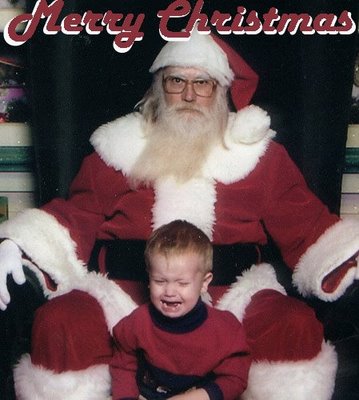
An interesting website to look at amusing pictures is CreepySantaPhotos.com. I remember as a child, being terrified of being put on Santa's lap and crying my head off. Parents place their children on the laps of complete strangers, telling them that the man is their beloved omniscient idol who watches over them and cares for them, when in fact it is just some unemployed chump making some extra cash working at the mall. It is the child's natural instinct to cry and avoid the situation, but parents suppress this normal, healthy behavior for the sake of their own personal warm fuzzies, at the expense of their child's psychological well-being. All this just to continue the deception.
My mom and countless others claim that Santa represents the "spirit of giving," but he doesn't really. At least not to kids. "I want a Hot Wheels Criss Cross Crash, I want a Millenium Falcon, I want a Snoopy Snow Cone Machine, I want a Lite Brite, a Cobra Terror Drome, and a..." See, that's not a spirit of giving. It's a spirit of, "Hey Mr. Pie in the Sky, here's the long list of stuff I want you to give me because I want all of it! Santa doesn't teach children the "spirit of giving." It teaches kids the spirit of "gimme gimme gimme." This, in turn, puts stress on parents, causing them to dash from store to store, looking for whatever gift their child desires to make them happy. How many car accidents has this caused? Or fist fights on Black Friday?
Instilling a belief in Santa Claus in children leads to disillusionment, as it did with me. For some kids, this could also lead to a crisis in faith. If your parents were lying to you all along about Santa Claus, were they lying to you about God too? After all, Santa is nearly like God in many ways, it seems. The Santa myth does not help children understand the spirit of giving, nor does it help them understand the true meaning of Christmas. Furthermore, this pseudo-Godlike Santa Claus conditions many people to have unrealistic expectations about the true nature of God and prayer. They are conditioned to think that just as their Christmas wish list resulted in the presents they wanted, their prayers should also be answered in the way they want them to, regardless of God's plan. Let's all just stop lying to our kids about Santa Claus.
 Go back to the "Greg's Life" Table of Contents
Go back to the "Greg's Life" Table of Contents
"Me imagining a world without religion is like John Lennon imagining a world without marijuana."
mail: greg -atsign- stevethefish -dot- net